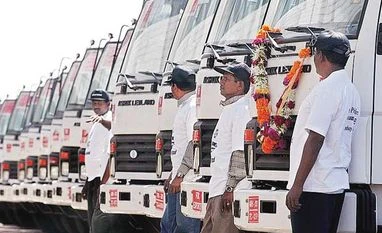Many Indian promoters have been accused of running their listed entities like their private ones. Decision making is restricted to the promoter and his carefully selected board members. Shareholder interest seems to be the least of their concern.
The latest example which reflects shareholder apathy is that of the promoters of Ashok Leyland. Ending two weeks of speculation, Ashok Leyland has announced the merger of group company Hinduja Foundries Ltd (HFL) with itself. As part of the merger, 100 shares of HFL will be converted to 40 shares of Ashok Leyland. Further, two series of GDR issued by HFL will also get converted to Ashok Leyland shares.
HFL is a supplier to Ashok Leyland along with many other automobile manufacturing customers. It might make sense to merge the company as a backward integration process, but nearly 55 per cent of HFL’s sales are in the tractor segment, which is not Ashok Leyland’s product line.
Gopal Mahadevan, Chief Financial Officer at Ashok Leyland said 36 per cent of HFL’s revenue comes from Ashok Leyland. HFL is India’s largest foundry group producing cylinder block and heads. The company supplies castings for automobiles and tractors, and industrial engines, construction equipment and power generation equipment.
With a diverse product range that services other OEM automobile manufacturers, synergies will be restricted to only backward integration of the limited products that will be consumed by Ashok Leyland.
More From This Section
More than operationally, it is the financial impact that shareholders of Ashok Leyland will have to bear. HFL has been making operating losses since FY2012, indicating that structurally the company’s business model has a problem.
In order to fund its losses, the company has been raising equity, as bank finance would be difficult with the kind of balance sheet it has. Its equity base has increased more than twelve fold from Rs 40.34 crore in March 2010 to Rs 528.76 crore in March 2016. Its carry-forward losses have completely eaten the bloated capital and all that is left are borrowings worth Rs 460 crore.
Most of the incremental equity funding has been done through the preferential route, subscribed largely by the promoter group and select institutions. But equity funding has done little to change HFL's financial health, since operating losses continue to bleed the company.
Left with little opportunity in what seems like a hopeless situation, the promoters decided to do the next best thing instead of directly funding the loss. They announced a merger with the bigger group company Ashok Leyland. Funding responsibility has now been passed from the promoters of HFL to Ashok Leyland.
Naturally the market is not happy with the merger and has reacted the only way it can -– selling the stocks. Ashok Leyland shares ended 3.3 per cent lower on Thursday on the National Stock Exchange, at Rs 81.6, close to their 52-week low of Rs 78.
ALSO READ: Ashok Leyland stock dips over 3% on news of merger with Hinduja Foundries
The fact that promoters would like to protect their interest ahead of their shareholders has been demonstrated in a number of group company mergers announced recently. Be it the case of Vedanta group or the Birla’s, shareholders have little say in the matter. Independent directors and institutional investors in the parent company rarely raise their dissent note. This emboldens promoters to run the companies as a private limited one, without any concern for other shareholders who on paper are supposed to be partners.
The fact that promoters would like to protect their interest ahead of their shareholders has been demonstrated in a number of group company mergers announced recently. Be it the case of Vedanta group or the Birla’s, shareholders have little say in the matter. Independent directors and institutional investors in the parent company rarely raise their dissent note. This emboldens promoters to run the companies as a private limited one, without any concern for other shareholders who on paper are supposed to be partners.
)